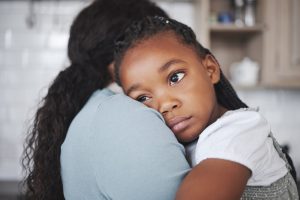Parenting is not an easy vocation to start but when extra issues in life pile up, then parenting can become even more difficult. When stressors, losses, illness, or problems arise, parents still need to be able to fulfill their duties to their children. There are no days off when it comes to helping the kids with school, taking them places, cooking, caring and spending time with them but sometimes parents can feel the weight of life, especially during loss and grief. When grieving and mourning enter into a parent’s life, mother or father do not have the luxury to call off work, or not the children to school, or skip dinner or not wash clothes. Parents are called to march forward. This is critical but it can also be bad for grieving and mental health.

The mental health for a parent is extremely important. Like in an airplane, when the steward or stewardess explains that in an emergency, adults should place the oxygen mask on first before applying to a child, it is for a reason. If a parent falls, the child or children will also fall. So while duty is critical, it is also critical for parents to find the space and time needed to grieve or mourn. In this blog, we will look closer at the difficult times, when parents have to grieve and still perform at high levels for the welfare of their children.
Mental Health and Support
In times of loss, mental health care and support are so important. While to many of us, our parents appeared as super powered beings, the reality is they suffered the same emotions we suffer as adults. They had good and bad days. They did not always choose the right decision and had to learn the hard way and they also dealt with loss. As younger children, we may not have noticed this, or maybe even very rarely, but our childhood image of our parents is due to their excellent ability to care. Unfortunately, some individuals may have negative experiences with parents. Their parents may have fallen victim to drinking and abuse, or vanished when loss occurred. They may have spoken nothing of loss or pain and hid it to their own detriment.

Our experiences with our parents can easily shape our own when parenting-for good and bad. It is important when grieving to find a balance. It is OK to show vulnerability to a child but also to ensure that the child still feels secure. So when dealing with grief and loss, parents need to be able to balance their own feelings and the need to maintain the security and welfare of their children. This involves allowing oneself time to mourn. The grief needs to be processed and experienced. If the grief persists and intensifies, then one should seek help from a grief counselor, and if it becomes pathological, one should seek the aid of a licensed professional counselor,
Some parents have better support than others. Some have a spouse to help lean on, while others have a bigger family to share the grief. Some parents though may be single parents, or have little or no family support. They may be over worked and have a full schedule that prohibits time. These over bearing responsibilities may compound the grief. So while some may be able to find the help they need or take time off, others live in a colder reality. Whether blessed, supported or alone and over worked, one can still find basic help services and as well as find time. Time may need carved out of the day, but one needs to find the time to process the loss, mourn, and be able to express it outwardly. If one does not find time to re-generate, whether through a walk, meditation, spiritual journey, exercise, or a discussion with a good friend, then the grief will only become stronger and parental burnout may occur.
Sharing Emotion within the Family Unit
Families may tend to be overtly open with emotion or introvert in regards to expressing it. Grief myths that dictate time schedules, or expression of grief, or sharing grief with children, can only fracture the family unit more. Instead, express grief with a spouse, or the children. Communicate that daddy or mommy are very sad. Reassure to the children that this will not affect their security but share with them the reality that you are going through grief and loss. This is an excellent way for children to learn to express empathy. Children will hug and listen and in their own way express grief too. The grief may very well be affecting not just you but the children as well. Hence it is important to discuss the loss and include the children in discussion of the loss with real and concrete words about the nature of death. Let the children partake in rituals and ceremonies and allow them to comfort you.

For most parents, the loss in all probability is of a parent, or tragically a sibling. These types of losses are extremely painful and children will also experience a shared loss. While it may be your parent you lost, it still their grandparent. Hence, it is important to share grief with the child or children and both mutually heal from each other. This not only helps heal but it also passes on good mourning skills. Many children inherit bad mourning skills. They learn to hide emotion, or turn to improper coping methods to curb grief through imitation of mom or dad.
Families can also grow together closer through grief. While also expressing, they can also memorialize loss and remember together the person over time. In addition, they can build relationships that are stronger through this shared experience of loss. Parents can be good grieving examples to their children and children can be good and empathetic listeners when they are permitted into a circle. Excluding them can have negative effects on yourself but also their development.
The Loss of a Child
If a mother miscarries, or the couple lose a child already born, this has life long ramifications. It is in itself, its own blog, but this is when parents need to not only grieve for the loss but also help the child grieve the loss of his/her sibling. It is so important to involve the child in the rituals and to let the child speak verbally or through play. Monitoring the child and ensuring they are exhibiting no magical thinking is important. If the child has guilt for the death, then it needs dismissed. So while the parent grieves, the parent also is ensuring that the surviving child still heals properly from the loss. Again this is why it is so critical that the family grieves together and proper grieving styles are passed on to the next generation.
Conclusion
Parenting not easy but when grief and loss are thrown into the middle, it becomes far more difficult. Parents need to not only care for their own mental health but they also need to express loss and grief to their children to ensure security for the child but also an understanding of what grief is and how to share it and be empathetic.

Please also review AIHCP’s Grief Counseling Certification, as well as its Child and Adolescent Grief Counseling Certification and see if the programs meet your academic and professional goals. The program is online and independent study and open to qualified professionals seeking a four year certification. The Child and Adolescent Grief Program is a specialty program that is only available for already those certified in Grief Counseling.
Additional Resources
“Can Parenting While Grieving Force You to Heal?”. Cytrynbaum, P. (2013). Psychology Today. Access here
“Parenting While Grieving”. Haley, E. (2015). Whats Your Grief. Access here
“Grieving While Parenting”. Eiseman, J. (2019). Mental Health Match. Access here
“Parenting while grieving”. Hetter, K. (2011). CNN. Access here
